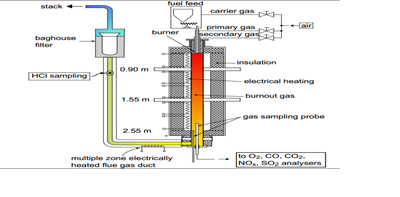
Leema Almakhadmeh
Jordan University of Science and Technology, Jordan
Title: Oil shale combustion under oxyfuel conditions
Biography
Biography: Leema Almakhadmeh
Abstract
Direct combustion of Jordanian oil shale under oxyfuel conditions was investigated. Unstaged and staged air-firing as well as combustion at 27% O2/73% CO2 (OF27) was conducted successfully. A 20 kW vertical reactor was used at a combustion temperature of 1200â—¦C. Oil shale- N conversion rate to NO is higher during unstaged air-firing than oxyfuel combustion; they are 27% and 15% for air-firing and OF27 combustion, respectively. NOx emission reduced efficiently by adopting staged combustion technology under oxy-fuel conditions as well as air-firing. In addition, the reduction of simulated recycled NO has been investigated. The actual situation has been simulated by injecting NO in the reactor through the burner during OF27 combustion. The reduction of the injected NO is more efficient with staging compared to unstaged combustion mode; 100% reduction of the injected NO during staged OF27 combustion is registered while for unstaged OF27 combustion it ranges from 57% to 65%. The high sulphur content in Jordanian oil shale is considered one of the biggest challenges for its utilization. The oil shale- S conversion rates to SO2 is lower during unstaged OF27 combustion compared to air-firing; they are 69% and 49% for air-firing and OF27 combustion, respectively. For both unstaged combustion modes, direct limestone injection at different molar Ca/S ratios has been investigated; SO2 emissions are reduced significantly by direct limestone injection. At Ca/S molar ratio of 3, the desulphurization efficiencies are 100% and 95% for OF27 combustion and air-firing, respectively.


